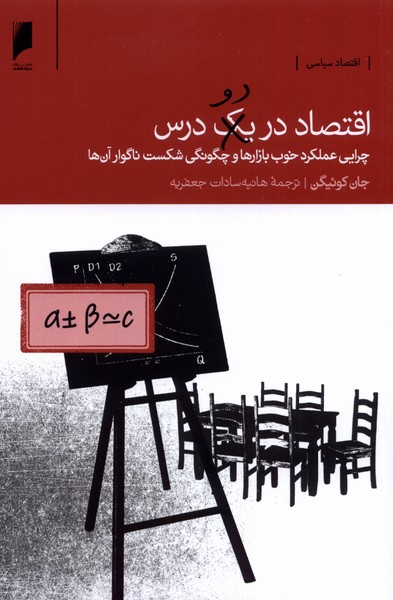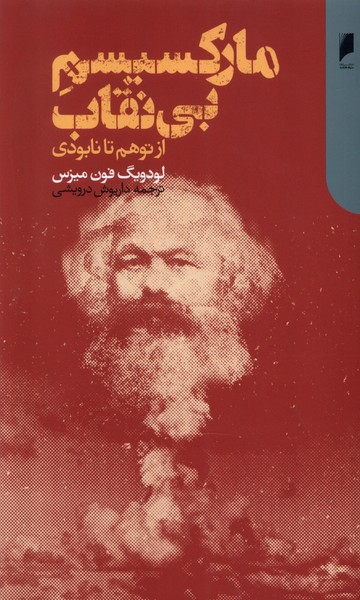اقتصاد در دو درس الفارسية 1445
Iqtiṣād dar Du Dars
23٫11 $
مشاركة
Wishlist
العنوان الأصلي:
Economics in Two Lessons: Why Markets Work So Well
,
and Why They Can Fail So Badly
ISBN رقم:
9786008591290
المترجم:
Hānīyah Sādāt Ja'farī
الناشر:
Dunya-yi Iqtisad
الفئة العمرية:
البالغون
الصفحات:
387
الوزن:
358 g
أبعاد المنتج:
14 x 21 x 3٫5 cm
غلاف الكتاب:
غلاف ورقی
A masterful introduction to the key ideas behind the successes―and failures―of free-market economics
Since 1946, Henry Hazlitt’s bestselling Economics in One Lesson has popularized the belief that economics can be boiled down to one simple market prices represent the true cost of everything. But one-lesson economics tells only half the story. It can explain why markets often work so well, but it can’t explain why they often fail so badly―or what we should do when they stumble. As Nobel Prize–winning economist Paul Samuelson quipped, “When someone preaches ‘Economics in one lesson,’ I Go back for the second lesson.” In Economics in Two Lessons , John Quiggin teaches both lessons, offering a masterful introduction to the key ideas behind the successes―and failures―of free markets.
Economics in Two Lessons explains why market prices often fail to reflect the full cost of our choices to society as a whole. For example, every time we drive a car, fly in a plane, or flick a light switch, we contribute to global warming. But, in the absence of a price on carbon emissions, the costs of our actions are borne by everyone else. In such cases, government action is needed to achieve better outcomes.
Two-lesson economics means giving up the dogmatism of laissez-faire as well as the reflexive assumption that any economic problem can be solved by government action, since the right answer often involves a mixture of market forces and government policy. But the payoff is understanding how markets actually work―and what to do when they don’t.
Brilliantly accessible, Economics in Two Lessons unlocks the essential issues at the heart of any economic question.
more
مقدمه ای استادانه بر ایده های کلیدی پشت موفقیت ها و شکست های اقتصاد بازار آزاد
از سال 1946، کتاب پرفروش «اقتصاد در یک درس» اثر هنری هازلیت این باور را رایج کرده است که اقتصاد را می توان در یک قیمت ساده در بازار خلاصه کرد که نشان دهنده هزینه واقعی همه چیز است. اما اقتصاد یک درس فقط نیمی از داستان را بیان می کند. میتواند توضیح دهد که چرا بازارها اغلب خوب کار میکنند، اما نمیتواند توضیح دهد که چرا آنها اغلب به شدت شکست میخورند – یا وقتی آنها دچار مشکل میشوند چه کاری باید انجام دهیم. همانطور که پل ساموئلسون، اقتصاددان برنده جایزه نوبل، به طعنه گفت: "وقتی کسی "اقتصاد در یک درس" را موعظه می کند، برای درس دوم برمی گردم." در کتاب اقتصاد در دو درس، جان کویگین هر دو درس را آموزش میدهد و مقدمهای استادانه از ایدههای کلیدی پشت موفقیتها و شکستهای بازارهای آزاد ارائه میدهد.
اقتصاد در دو درس توضیح میدهد که چرا قیمتهای بازار اغلب در انعکاس هزینه کامل انتخابهای ما برای کل جامعه شکست میخورند. به عنوان مثال، هر بار که ما رانندگی میکنیم، با هواپیما پرواز میکنیم یا کلید چراغ را تکان میدهیم، در گرم شدن کره زمین سهیم هستیم. اما، در غیاب قیمتی برای انتشار کربن، هزینههای اقدامات ما بر عهده دیگران است. در چنین مواردی، اقدام دولت برای دستیابی به نتایج بهتر مورد نیاز است.
اقتصاد دو درس به معنای کنار گذاشتن جزم گرایی لایسزفر و همچنین این فرض بازتابی است که هر مشکل اقتصادی را می توان با اقدام دولت حل کرد، زیرا پاسخ درست اغلب شامل ترکیبی از نیروهای بازار و سیاست دولت است. اما نتیجه این است که بفهمیم بازارها واقعاً چگونه کار میکنند – و وقتی این کار را نمیکنند چه باید کرد.
«اقتصاد در دو درس» که به خوبی در دسترس است، مسائل اساسی را در قلب هر سؤال اقتصادی باز می کند.
more
















